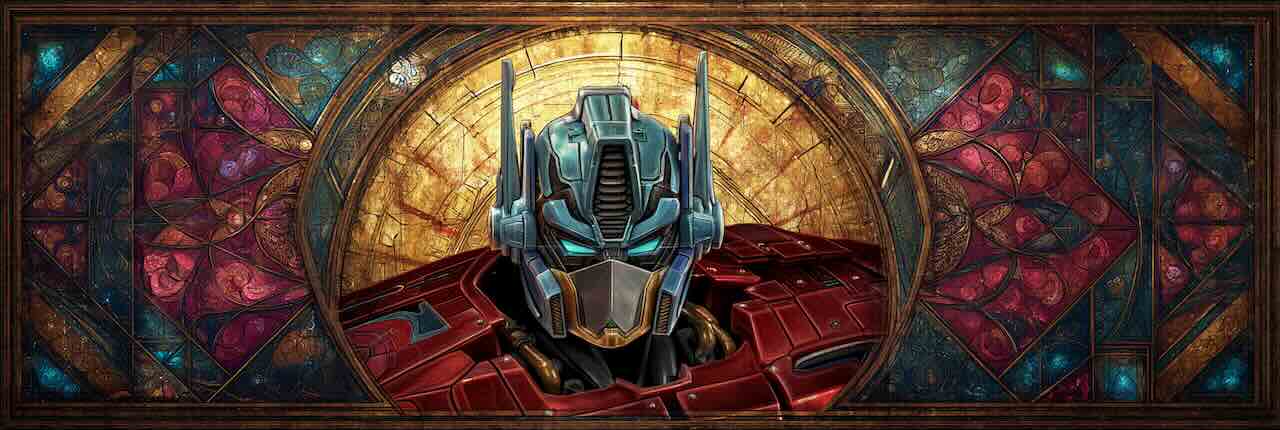This piece of writing is likely going to be something half-baked for quite some time. That being said, if the only person I’m really writing for is myself, it shouldn’t matter.
A few weeks ago (probably a phrase I’ll use often — and whether it was actually a few weeks ago or a few years ago, who can tell? Time is fickle…) I arrived at church early one morning to serve behind the altar with my priest. I was wearing a T-shirt with a 1980s G1 Optimus Prime on it, and chiding me with a big smile and a loving voice, my priest said, “You’re nothing but a big kid!”
Me: “You’re right, Father. But do you know what Optimus Prime’s famous line is?”
Fr: “No idea.”
Me: “‘Til all are one.”
Fr: “That’s a pretty good line.”
Unity
This is something I think about a lot. More stories:
A few years ago, early after we arrived in the community where we now live, I had only just begun getting to know our parish priest. I had recently had ACL surgery, and he drove to our home to visit. As we sat on the couch in my office, getting to know each other (as best I can remember), we began to argue as we realized how different we were. We had different views on numerous social and other issues, and our dialogue became quite heated.
To be honest, I don’t really remember how that visit ended. What I do remember is how utterly devastated I felt. I had no idea how I was supposed to follow this man or be led by him as my priest. I began to internalize a belief that he would hate me—or at least strongly dislike me—and I started to panic.
At that point, I did what anyone would do: I reached out to two close friends to talk, and I emailed my previous parish priest in a panic (oh look, alliteration!). I found that email later—it was borderline incoherent and had far too much preamble. The relevant portion was basically:
I really need guidance […]. Half the time I don’t know what to do, and half the time I just feel like I’m going to start crying […]
That afternoon I spoke on the phone with my former priest, and he talked me off a ledge. There are a few tidbits from that conversation I remember specifically, but none of them are overly important to the rest of this story.
Over the next several weeks, I felt a lot of fear leading up to attending Liturgy. And yet, something happened that I did not expect: my priest loved me.
Never again did he bring up our disagreements. He never condemned me, never indicated any lingering tension, and never treated me with anything other than total and unconditional love and kindness.
In the years since, we’ve joked about our different ways of viewing the world. But he has made it abundantly clear that there is nothing more important than our unity. He has said it again and again—to me and to our parish—that there is no room for disunity in the Church. In short, I think it’s fair to summarize that he doesn’t care what we disagree on, as long as we agree on Christ.
Do we stand in church and say the Symbol of Faith together? Do we stand together and say, “Forgive me, brothers and sisters,” and come to the chalice with gratitude to God, and afterward hear:
“Behold, this has touched your lips, taken away all your iniquity, and cleansed you from all your sins.” (Isaiah 6:7)
Years later, this priest has baptized me, baptized my son, offered me the joy of serving with him behind the altar, and loved me unconditionally. He is a living example of what unity of faith means.
The Prayer
As is prayed during Small Compline:
Surround us with your holy angels, that, guarded and guided by their host, we may arrive at the unity of faith and the understanding of your ineffable glory.
A Small Life in a Big World
It feels very hard to live a small life (more on that another time) when the world is so big and so accessible in this day and age. In the past few days alone, we’ve read of schism in the Anglican Church and seen more and more discussion in public discourse about “American Orthodoxy.” I’m not American (I live in Canada), but I’m deeply affected by—and have developed a general disdain for—patriotism and nationalism. The discourse south of our border often centers on American Orthodox Christians wanting “their own” Orthodoxy, usually accompanied by large American flags on Orthodox websites. It fills me with deep sadness.
People regularly call me pedantic, but words are important. There is no such thing as “American Orthodoxy,” nor “Greek Orthodoxy,” nor “Russian Orthodoxy.” Properly understood and lived, there is only the one, holy, catholic, and apostolic Church, whose people happen to live in America, Greece, Russia, or anywhere else.
It is not our job to make Orthodoxy ours. It is our job to make ourselves Orthodox. We do not say, “How can I make my vision of theosis fit within the framework of my nationalistic ideas?” We say, “How can I throw off my nationalism, my politics, the dominating culture of my day—the world—and put on Christ?”
And, brothers and sisters, these are two very different things.
